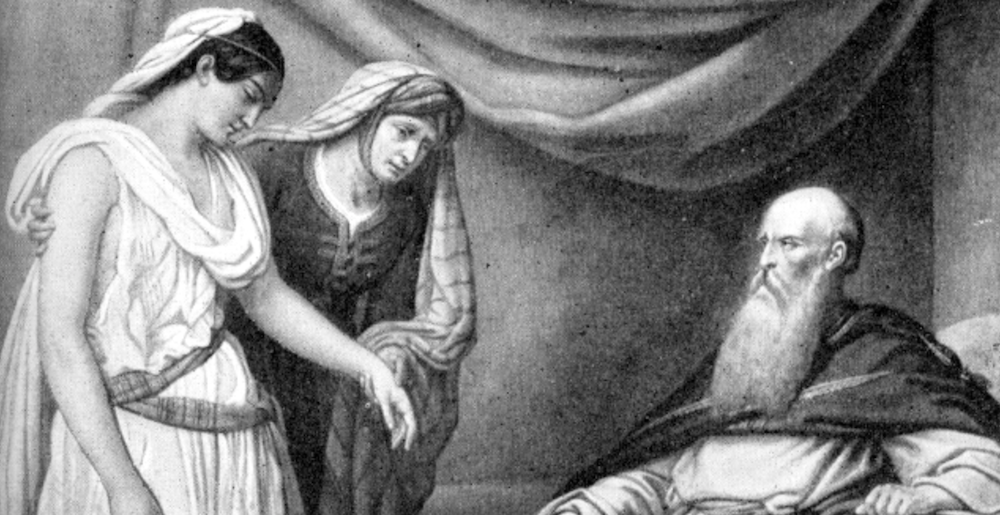Would an Agency-Denying Principle Be Restored?
“The twin relics of barbarism, polygamy and slavery,” as described in the 1856 GOP Convention, seemed to go hand in hand for women. In Old Testament times a woman was not alone in being a slave, but her role as property uniquely included sometimes being given or taken as plural wife or concubine. Such was the case of Hagar, Sarah’s handmaid.
The scripture in Genesis 16:1-3 tells us that Sarah gave her maid Hagar to Abraham to wife. This makes sense in the context of the Old Testament: Hagar was a woman, she was property, and her freedom to choose was irrelevant—that is how things were in those days. The related scripture recorded in D&C 132:34 says,
“God commanded Abraham, and Sarah gave Hagar to Abraham to wife. And why did she do it? Because this was the law; and from Hagar sprang many people. This, therefore, was fulfilling, among other things, the promises.”
From this version of the story the same thing happened: Sarah gave Hagar to Abraham to wife, but now God commanded it and it fulfilled promises (there’s no mention of God commanding or promises fulfilled in the Bible, but I digress). Missing from this scripture is any explanation of Hagar’s opinion on becoming a second wife, which was understandably unimportant in Old Testament times, but what about in Doctrine and Covenant times?
Unlike the Old Testament version of Hagar’s story, the Doctrine and Covenants version was being told in the United States when polygamy and slavery (at least for white women) were not part of the culture. Now this story becomes an example for today’s Restored Church, which has a central teaching of God-given agency—a gift that is extended to women.
Abraham’s relationship with Hagar is viewed by some Christian and Jewish faiths as Sarah’s idea and not in accord with God’s moral law. On the other hand, our version claims God restored and commanded this disruption to family life (without giving instructions on how it should be implemented), but continues to leave Hagar’s agency out of the restored, modern-day polygamy equation.
Why does this Hagar example, which became the basis for latter-day plural marriage, involve a slave with no right to express her opinion?
We are often reminded the strong, early Church-history-women chose plural marriage. They did, and they lived at a time when they had more privileges than Hagar. But they still did not have the nearly equal status women enjoy today. Also, they were under ecclesiastical and social pressure to support this principle, fearing a God who commanded polygamy and fearing His punishment if they opposed it. In 1867, Brigham Young said:
“Woe to every female in this Church who says, ‘I will not submit to the doctrine that God has revealed.’ You will wake up by and by and say, ‘I have lost the crown and exaltation I might have gained had I only been faithful to my covenants and the revelations which God gave. I might have been crowned as well as you, but now I must go to another kingdom.’ Be careful, O, ye mothers in Israel, and do not teach your daughters in future, as many of them have been taught, to marry out of Israel. Woe to you who do it; you will lose your crowns as sure as God lives. Be careful! ‘Well,’ but say you, ‘these men, these elders of Israel, have it all their own way.’ That is not so, and we are not going to have it all our own way, unless our way is to do just right. And the man and woman, who set up their will against the providence of God, will be found wanting when accounts are squared. They will have to say, ‘the summer is past, the harvest is ended, and we have not received our crowns.’ Will you think of this, sisters, you who are not married as well as you who are? I have a good many daughters, but it would be better for every one of my daughters, and for every female in this Church, to marry men who have proved themselves to be men of God, NO MATTER HOW MANY WIVES THEY HAVE, than to take these miserable characters who are running around here.”
Did hearing words like these from a man they believed to be a prophet of God allow early Church-history women the freedom to choose? Or did the example of Hagar, who had little say in this matter, apply to these latter-day women also?
While this is not the LDS Church’s message today, D&C 132:34, recorded in scripture for our day, suggests God commands that women be given as wives, treated like property, and their freedom to choose is insignificant. In fact, some fundamentalist sects justify this exact treatment of women using this verse and others from D&C 132. I believe our loving God does not condone agency-denying principles—not the biblical practice of plural marriage any more than the biblical practice of slavery.
This is part of an essay that first appeared on SquareTwo
